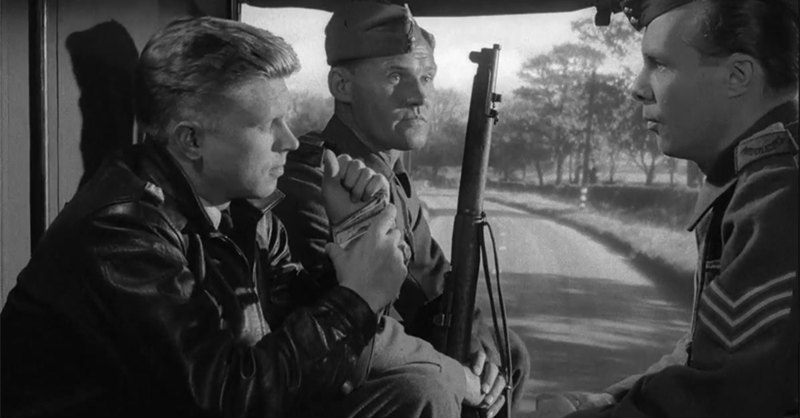“The King of Comedy” is a strange film.
It stars Jerry Lewis, but cast against type in a serious dramatic role.
It’s about an aspiring stand-up comedian with a goofy name (Robert De Niro as Rupert Pupkin), but it’s not all that funny, even during an extended monologue.
It’s a crime story about obsessed fans who kidnap a celebrity, but there’s surprisingly little tension.
It’s a Martin Scorsese film, yet there isn’t a mean street to be found. Just about everything takes place within a few miles of Times Square.
And like the old “Secret Life of Walter Mitty,” starring Danny Kaye (I haven’t seen the remake yet), it offers a narrative that’s at least one-fourth occupied by fantasy segments—yet there isn’t enough variety in those segments or enough revelation of character beyond the “I wanna be famous” impulse that drives Pupkin to make them interesting.
This 1982 comedy-drama is a commentary on celebrity and the worship of celebrity, and, the fantasy that everyone who isn’t a celebrity has about somehow, someday becoming one or drawing close to one. Given the glut of reality shows that offer the average Jane or Joe a chance at celebrity, “The King of Comedy” is a prescient film, and I can appreciate that.
But it’s not exactly an entertaining film, nor does it feature a mesmerizing storyline—mostly because of those fantasy segments, which quickly get old.
For me, it’s almost hard to believe that THIS was the film Scorsese chose to make after “Raging Bull.” Then again, I still find it difficult to accept that Scorsese was also the director of that Depression-era disappointment, “Boxcar Bertha” (1972).
But I will say this: If you’re a De Niro fan, you’ll enjoy his performance as an imbalanced individual with a one-track mind. Though the scenes of him living in his mother’s basement, acting out fantasies on an elaborate set that he had constructed, wear as thin as the fantasy segments and feel more like a running joke that’s run out of gas, De Niro is creepily convincing.
So is Sandra Bernhard as Masha, a fellow obsessed fan who met Rupert in the mob of fans waiting to collect autographs outside backstage exits. Like Rupert, she stalks late-night host Jerry Langford, but in her own way, and decides to help him with his plan to kidnap Langford so they both can get what they not-so-secretly desire. And if you’ve only seen Lewis in the slapstick comedies he made as a young man, his dramatic chops will surprise you.
While we never hear her, those who are charting Scorsese’s use of his mother in films can add another title, for it’s Catherine Scorsese’s nagging voice we hear every time Rupert’s fantasy enactments get a little too loud.
Ultimately, though, the plot isn’t complex enough, the fantasies aren’t revelatory enough, the “perps” aren’t menacing enough, and the film isn’t funny or suspenseful enough to be entertaining in and of itself. And because there isn’t enough humor or an obvious target, you can’t even call it a satire of celebrity in America. The best you can say is that it’s a commentary, and this is one case where a subtle film would have benefitted from Scorsese’s natural tendency to be less restrained.
Video:
Although the TV segments are intended to look rougher, the bulk of the film has a good amount of detail, though the edges aren’t as sharply defined as contemporary films on Blu-ray, which results in a slightly flatter appearance. But the colors seem true, and the AVC/MPEG-4 transfer to a 50GB disc reveals detail even in darker scenes. There’s also a slight layer of filmic grain throughout, which adds a sense of period. “The King of Comedy” is presented in 1.85:1 aspect ratio.
Audio:
The audio goes as big wonky in one spot around the kidnapping, where the voices become slightly muffled or muted. Aside from that and the crackly TV segments, “The King of Comedy” has a decent soundtrack despite the limitations of the English DTS-HD MA 1.0 Mono. Additional audio options are Spanish and French Dolby Digital 1.0, with subtitles in English SDH and Spanish.
Extras:
There are only a few bonus features on this 30th Anniversary Blu-ray, but they’re surprisingly good. Close to 40 minutes of deleted and extended scenes illustrate more of the restraint Scorsese showed with this film, while you can hear him talk on a half-hour Tribeca Q&A panel with his two stars as they think back to the project. And, in addition to the original theatrical trailer, there’s a vintage making-of feature that runs 19 minutes and offers the usual blend of talking heads and clips.
Bottom line:
“The King of Comedy” earned a 93 percent “fresh” rating at Rotten Tomatoes, but I’m going to side with the dissenters this time. I can see where it might be perceived as a dark comedy, but that label doesn’t absolve it from an overarching sense that Scorsese didn’t push this one far enough . . . or a sense of sameness that results from all those fantasy segments that never quite reveal as much as the director seems to think they do. The third act really picks up interest and the satire sharpens at the end, but compared to a social commentary like “Network,” “The King of Comedy” still seems lacking. Roger Ebert wrote that he walked out of the first screening “filled with dislike for the movie,” but later gave it another chance and ended up giving it the equivalent of a 7 out of 10. I guess I’m not feeling that generous.


